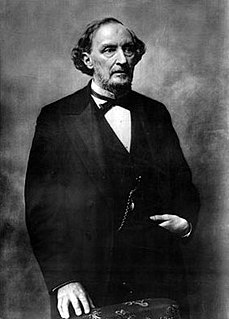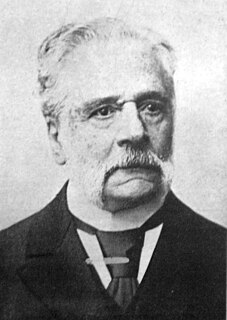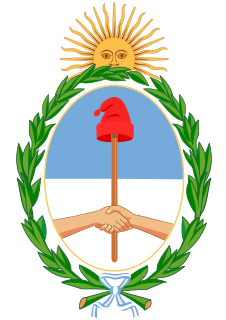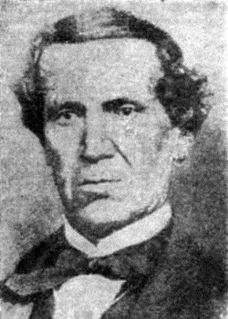
Bartolomé Mitre Martínez was an Argentine statesman, military figure, and author. He was the President of Argentina from 1862 to 1868.
Federalization, in Argentine law, is the process of assigning federal status to a territory with the purpose of making that territory the national capital.
The Battle of Cepeda of 1859 took place on October 23 at Cañada de Cepeda, Santa Fe, Argentina. The Republic of the Argentine Confederation army, led by Federal Justo José de Urquiza defeated the State of Buenos Aires forces, led by Unitarian Bartolomé Mitre.

Carlos Casares was an Argentine rancher, executive, and politician.

Bernardo de Irigoyen was an Argentine lawyer, diplomat and politician.

Carlos Tejedor was an Argentine jurist and politician, Governor of Buenos Aires Province between 1878 and 1880. Tejedor was a prominent figure in the movement against the Federalization of Buenos Aires.

Argentina held nine presidential elections between 1862 and 1910, every six years.

Mariano Acosta was an Argentine lawyer and politician.

The Argentine Civil Wars were a series of civil wars that took place in Argentina from 1814 to 1880. These conflicts were separate from the Argentine War of Independence (1810–1820), though they first arose during this period.

Argentine legislative elections of 1912 were held on 7 April 1912 for the Argentine Chamber of Deputies. The first free, democratic elections in the nation's history, the contest had a turnout of 68.5% and produced the following official results:

Adolfo Saldías was an Argentine historian, lawyer, politician, soldier and diplomat.

The State of Buenos Aires was a secessionist republic resulting from the overthrow of the Argentine Confederation government in the Province of Buenos Aires on September 11, 1852. The State of Buenos Aires was never recognized by the Confederation or by foreign nations; it remained, however, nominally independent under its own government and constitution. Buenos Aires rejoined the Argentine Confederation after the former's victory at the Battle of Pavón in 1861.

Luis Lorenzo Domínguez (1819–1898) was an Argentine politician, poet, historian, journalist and diplomat. In addition, he was the Minister for Economic Affairs for Argentina and served as an ambassador for Argentina to the United States and the United Kingdom and Spain.

Manuel José Gómez Rufino was an Argentine politician who was governor of San Juan Province, Argentina between 1857 and 1858 and again between 1873 and 1874.

The Argentine presidential election of 1862 was held on 4 September to choose the first president of Argentina. Bartolomé Mitre was elected president.
The Argentine presidential election of 1868 was held on 12 April to choose the president of Argentina. Domingo Sarmiento was elected.
The Argentine presidential election of 1880 was held on 12 April to choose the president of Argentina. Julio Argentino Roca was elected president.
The Argentine presidential election of 1898 was held on 10 April to choose the president of Argentina. Julio Argentino Roca was elected president for a second period.


















